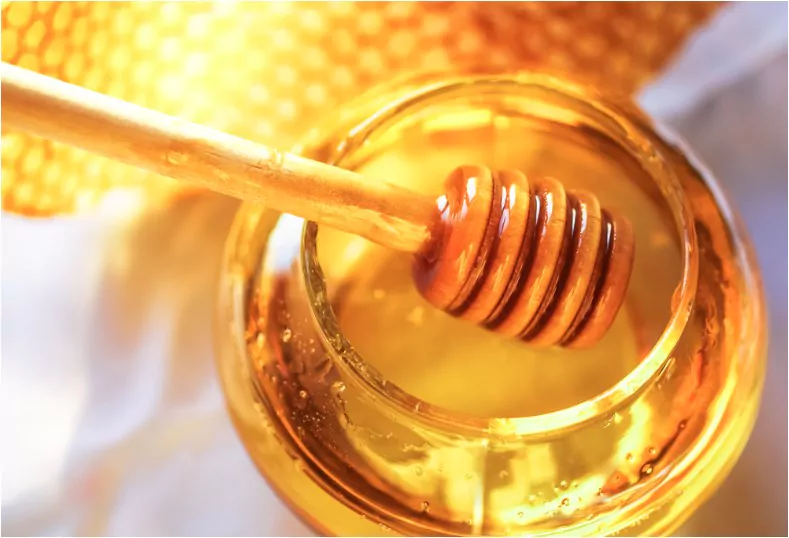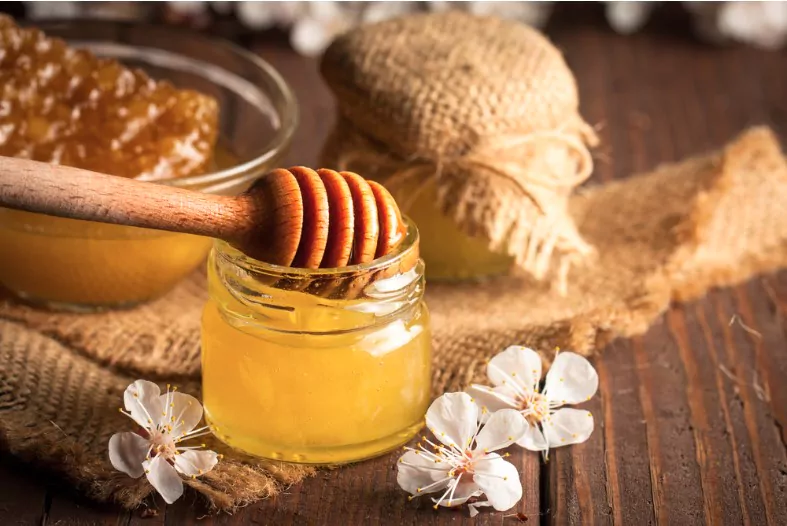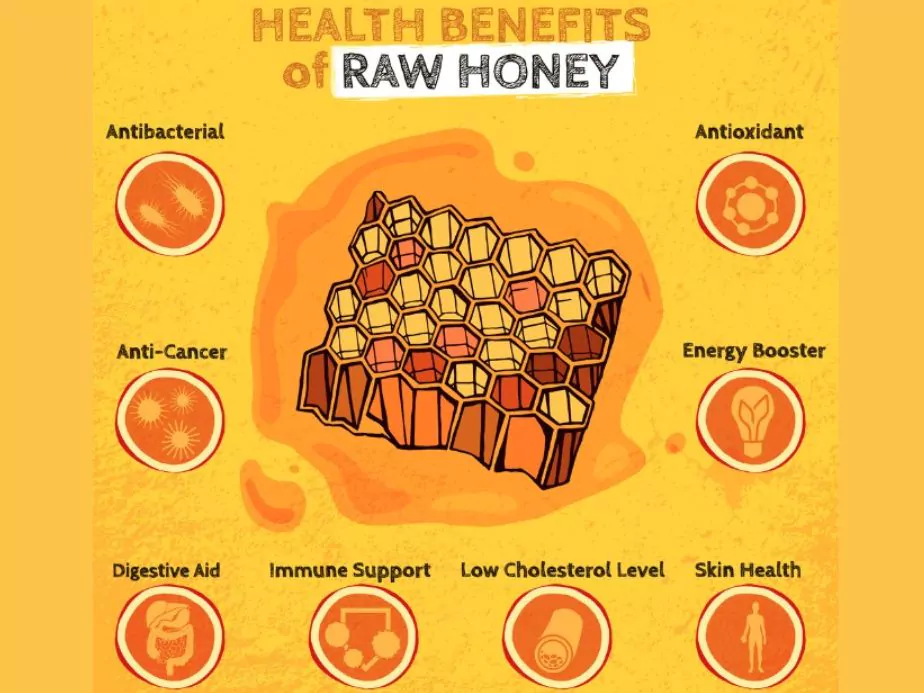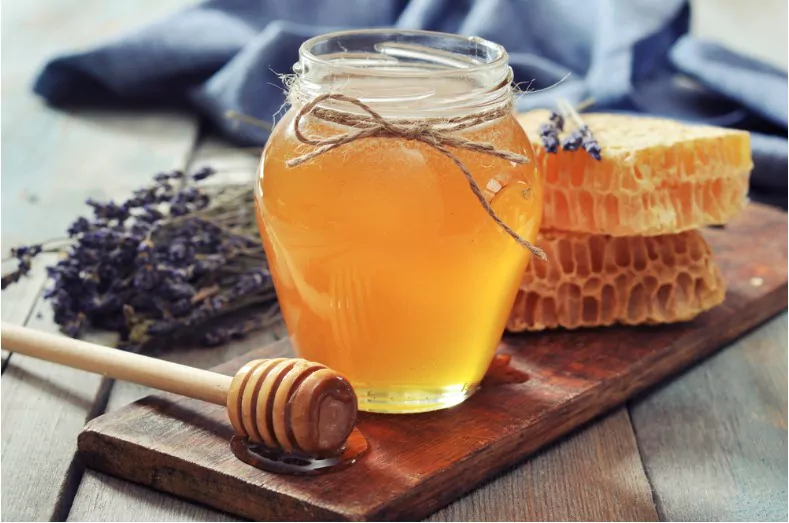Unveiling Remarkable Health Benefits of Honey

Honey, a sticky substance produced by bees from the nectar of flowers, has long been revered not only for its sweet taste but also its medicinal and cosmetic uses. This natural sweetener has been consumed for thousands of years, but what are the actual health benefits of honey? Recent clinical research has shed light on the many benefits of consuming honey, making it more than just a delicious treat.[1]
1 Honey: The Basics
Honey bees produce honey by collecting nectar from flowers. The nectar undergoes a series of transformations through enzymes produced by the bees, ultimately leading to the honey we know and love. Depending on the types of flowers the bees visit, different varieties of honey, such as clover honey, eucalyptus honey, tupelo honey, and sourwood honey, emerge, each with a unique flavor and appearance. For instance, light amber-toned clover honey has a mild flavor, while the darker buckwheat honey offers a robust taste.
2 Raw Honey Vs. Processed Honey

When buying honey, you may come across labels like ‘raw honey’ or ‘pasteurized honey’. Raw honey or unpasteurized honey retains most of its natural antioxidants, beneficial nutrients, and enzymes. On the other hand, processed or pasteurized honey undergoes heat treatment which can reduce its nutritional value. A concern related to honey is adulteration, where the product might be diluted with syrups. Thus, it’s recommended to buy honey from reputable sources to ensure you’re getting pure, unadulterated honey.
3 Health Benefits of Honey

Anti-Inflammatory and Antibacterial Properties
Honey contains natural compounds that give it anti-inflammatory effects, beneficial in wound management, and soothing sore throats. Its antibacterial properties, often attributed to hydrogen peroxide and other components, enable honey to fight infections and kill bacteria, enhancing wound healing. In fact, manuka honey, a type of honey native to New Zealand, is renowned for its strong antibacterial properties and is even used as medical-grade honey in wound care.
Rich in Antioxidants
Honey is packed with natural antioxidants, which play a role in protecting our bodies from free radicals that contribute to premature aging and diseases like heart disease. The antioxidant properties of honey, especially in varieties like buckwheat honey, have been praised in various studies.
Cough Relief
One tablespoon of honey can be effective in alleviating nocturnal cough and improving sleep quality, even outperforming some over-the-counter medications in terms of cough symptom relief.
Heart Health
Some studies suggest honey’s beneficial compounds can help reduce high blood pressure, a significant risk factor for heart disease.
Skin Benefits
Applying honey as a topical treatment can improve skin tone, treat burns, and provide hydration for dry skin.
Digestive Health
Honey may offer relief from digestive issues, with some people consuming honey to soothe acid reflux or gastritis.
Enhanced Sleep
Consuming honey can lead to a rise in insulin levels, leading to the release of serotonin, which our bodies can convert to melatonin, a compound that improves sleep quality.
4 More than Just Honey: Bee Pollen, Royal Jelly, and Propolis
While honey boasts numerous health benefits, other products like bee pollen, royal jelly, and propolis, associated with honey bees, also offer therapeutic properties. Bee pollen, for instance, is a mixture of flower pollen, nectar, and bee saliva and contains amino acids and trace amounts of vitamins and minerals. Royal jelly, the food for the queen bee, has anti-inflammatory properties, while propolis, a resin-like substance, possesses antifungal properties and aids in fighting infections.
5 Safety and Consumption
While honey is packed with beneficial compounds, it’s crucial to consume honey as part of a balanced diet. Moreover, honey should never be given to infants under 12 months due to the risk of botulism. Some people might experience an allergic reaction to honey or its components, so it’s always best to be cautious when trying honey for the first time.
6 The Different Types of Honey
Each type of honey, from manuka to clover to eucalyptus, brings with it distinct flavors, appearances, and benefits. Manuka honey, for instance, stands out for its medicinal properties, while tupelo honey is cherished for its light and buttery flavor. Buckwheat honey, rich in antioxidants, has been linked to benefits for heart health and high blood pressure.

7 Wrapping Up
In the world of healthy food, honey holds a special place. Its health benefits, from anti-inflammatory effects to wound healing capabilities, make it a sought-after natural remedy. Whether you prefer to eat honey straight from the spoon, use it as a natural sweetener in your tea, or apply it on your skin for cosmetic benefits, honey offers a myriad of benefits for overall health.
When choosing honey, opt for raw honey over processed variants to maximize its health benefits. Remember, while honey is beneficial, its consumption should be in moderation, and always consider potential allergic reactions.
In conclusion, the benefits of honey extend far beyond its sweet taste. From healing wounds to improving heart health, recent clinical research continually supports traditional beliefs about honey’s health benefits. So, the next time you enjoy that golden elixir, take a moment to appreciate the wonders of what bees produce and the myriad of ways in which honey enables a healthier life.
Community Q&A
References
-
1.
Tahereh Eteraf-Oskouei1, and Moslem Najafi: Traditional and Modern Uses of Natural Honey in Human Diseases: A Review. - Retrieved on June 13, 2013
About This Article
This article has been viewed 203 times.



